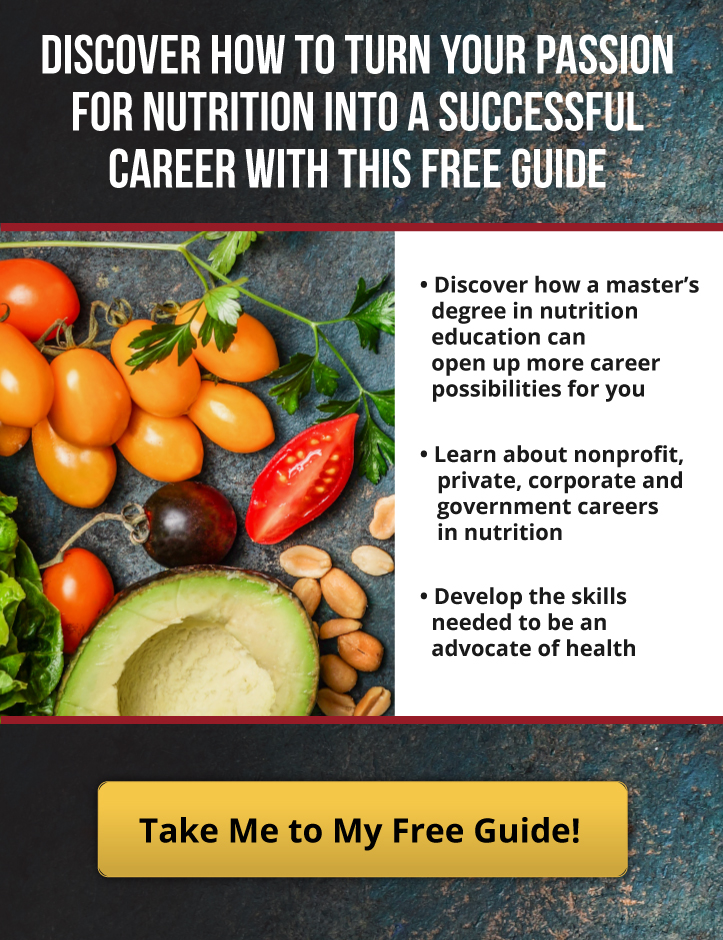Maybe you feel like you’re a natural teacher, but the subjects that are most common in teaching—math, reading, language, science, and history—aren’t exactly where your heart lies.
 Instead, your true passion is nutrition and understanding how total body nutrition and fitness contribute to overall health and happiness. You may even be working on an undergraduate degree or considering a master’s in nutrition, but aren’t sure where that path might lead in terms of jobs. Why not combine the two? Together, your instinctual teaching skills combined with a Master of Science in Nutrition Education can set you up for a rewarding career as a nutrition educator. This role will allow you to help others lead better lives while being fueled by your passion for nutrition and wellness.
Instead, your true passion is nutrition and understanding how total body nutrition and fitness contribute to overall health and happiness. You may even be working on an undergraduate degree or considering a master’s in nutrition, but aren’t sure where that path might lead in terms of jobs. Why not combine the two? Together, your instinctual teaching skills combined with a Master of Science in Nutrition Education can set you up for a rewarding career as a nutrition educator. This role will allow you to help others lead better lives while being fueled by your passion for nutrition and wellness.
If this is something you might be interested in, it’s a good idea to make sure you have a firm grasp of the science of total body nutrition as well as an understanding of how best to communicate health information. After all, the people you teach may not always have your level of knowledge so it will be important that you are able to explain advanced nutrition ideas in straightforward and easy-to-understand ways.
Defining a “happy body” from the inside out
Most people understand that better nutrition equals better health. But they probably aren’t aware of exactly how the various aspects of nutrition affect the workings of the human body.
Our skeletal structure, muscles, tissues, organs, hormones, nervous system, and even skin, hair, and nails all need specific nutrients to function at their highest levels. And in the end, it all comes down to healthy cells, no matter where they are in the body or what they do. To help others aspire to total body nutrition, you need to be able to explain the main components of a healthy diet and convey how they affect the body.
- Protein: Protein molecules are heavy lifters in cellular work and are needed for structure and function of our organs and tissues. They play major roles in antibody creation, enzyme production, hormone balancing, repair, and creation of cells and transmission of signals between different areas of the body.
- Carbohydrates: Carbohydrates are the main source of energy for the body and brain. They are broken down into blood glucose molecules, which supply energy through the bloodstream. But the emphasis should be on those found in grains, fruits, beans, and vegetables, not those found in processed foods filled with sugar.
- Fats: Good fats – those that come from olives, nuts, seeds, and fatty fish – are essential to the body’s health. The essential fatty acids help protect our vital organs, control cholesterol, and store energy. They also help protein do its job.
- Antioxidants: These disease-fighting powerhouses are found in fresh fruits and vegetables and help repair damage to cells from free radicals, which are reactive molecules that can damage healthy cells.
- Vitamins and minerals: These nutrients play hundreds of crucial roles in the body. Deficiencies in certain areas can lead to disease, while proper amounts help protect from disease. Vitamins and minerals help heal cells that need it and keep different areas of our bodies functioning at a high level.
Teaching others about nutrition is a valuable talent
All that information is a very broad-spectrum look at how nutrition affects the body; it’s easy to see how many people have difficulty learning and incorporating nutrition information into their daily lives. That’s why there’s great demand and a real need for individuals who can make the concept of total body nutrition easy for everyone to understand.
If you are already passionate about health and wellness, and more specifically how nutrition affects the body, turn your passion into a meaningful career that has the ability to change the lives of others for the better.
According to the Bureau of Labor Statistics, employment of dietitians and nutritionists in the United States is expected to grow 16 percent through 2024. The growing public interest in health and wellness, specifically in the role nutrition plays, has helped spark the recent demand for dietitians and nutritionists and will continue to drive employment in the field. “As the relationships among diet, health, and disease prevention have become clearer, nutrition education and the promotion of healthy eating behaviors and lifestyles continue to receive increased attention,” says a USDA Food & Nutrition Service report to Congress in 2010.
Focusing your talents and skills on nutrition education as opposed to, say, meal planning or food science research can open up a huge number of doors in a variety of settings. For example, with a master’s degree in nutrition education you can:
- Teach nutrition at the elementary, secondary, or university level
- Write curriculum for food boards or state boards of education
- Start your own business and work as a private nutrition coach
- Climb the corporate ladder as a corporate nutritionists or wellness consultant
Want to learn what else you can do with a Master of Science in Nutrition Education?
Request more information on the online Master of Science in Nutrition Education or call 855-725-7614 to speak with an admissions adviser today.



